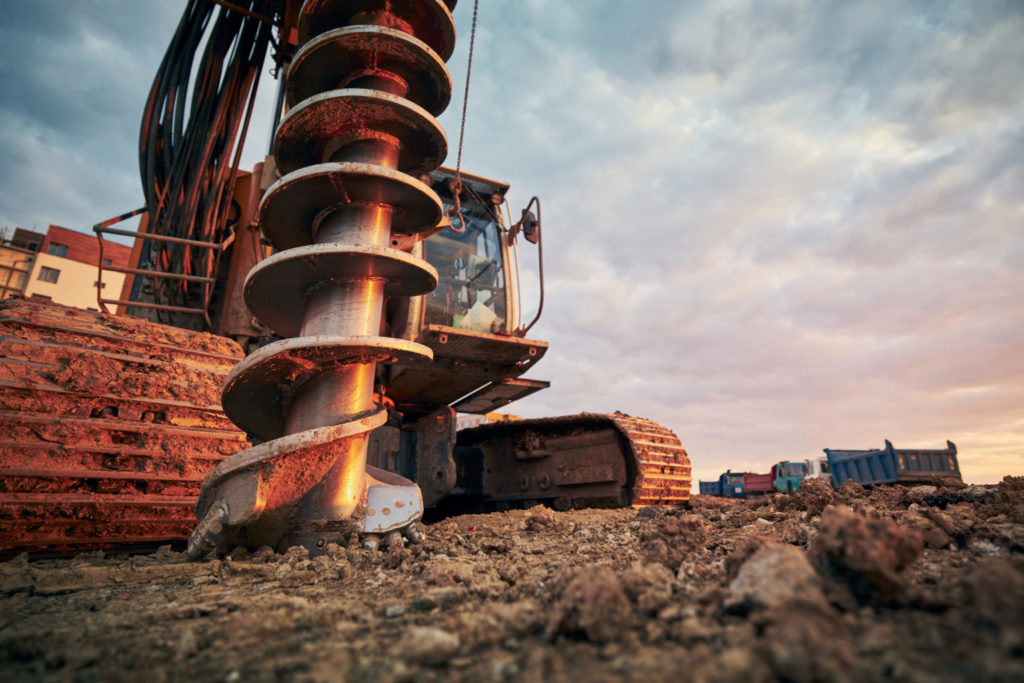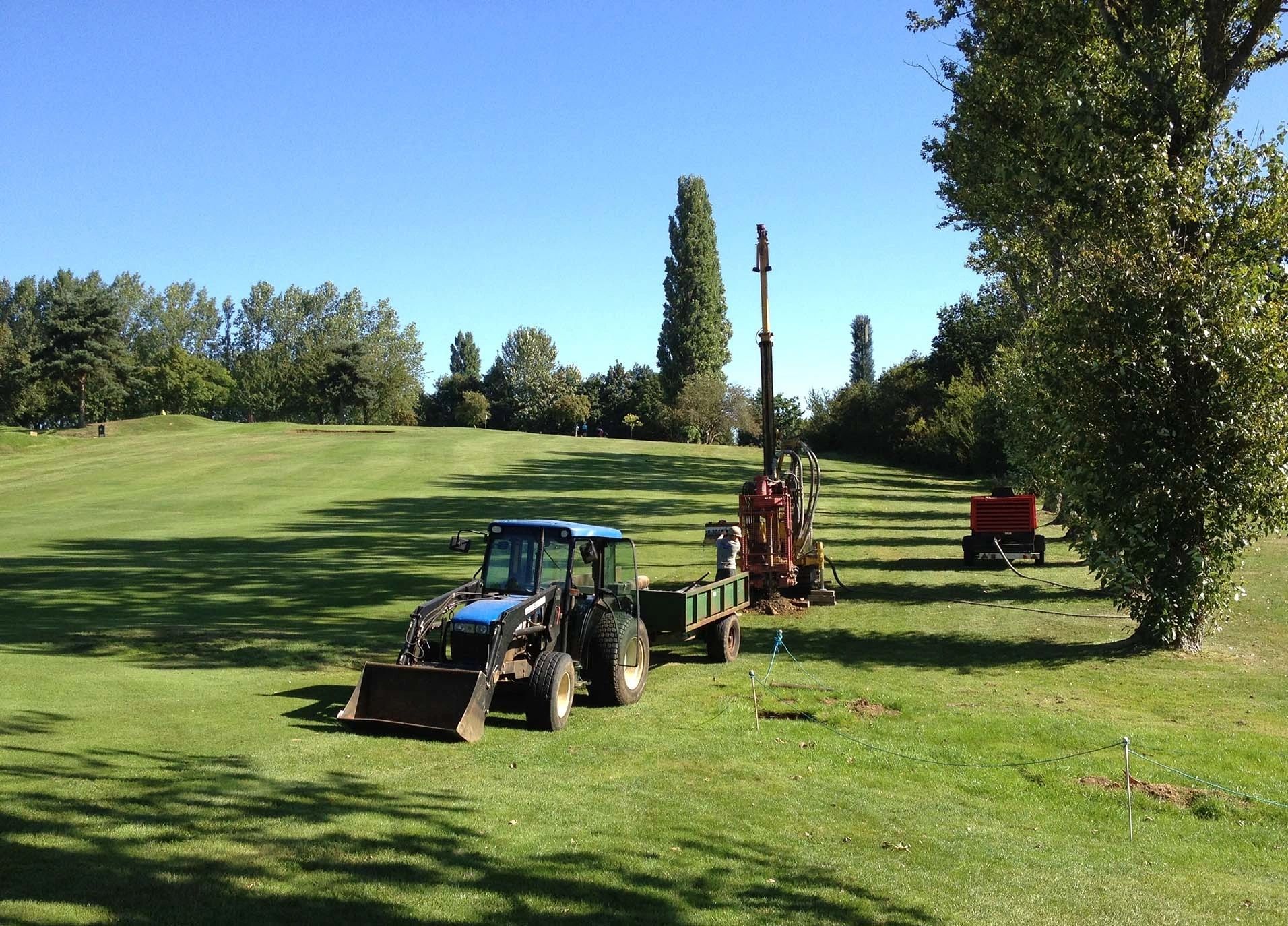
Water boreholes: Get the facts
Mains water is becoming increasingly expensive; more homeowners are realising a water well is an option. We’ve been drilling boreholes for water across the UK in residential and rural locations for all sorts of uses. Read on to learn about your options.
Water boreholes can go by many different names: water wells, bore holes or borewells . Essentially, they all do the same thing; offer a self-reliant pure source of water.
Discover more about water boreholes
A water borehole supply has several benefits, not least saving you money! You’ll escape any potential drought restrictions and your own private water source will free you from your mains supplier.
Borehole water is also sustainable since it comes from the aquifer deep down where it’s stored and renewed naturally from rainfall and snow.
We’ve answered some of the most common questions we get asked by customers who are considering investing in a private water supply.
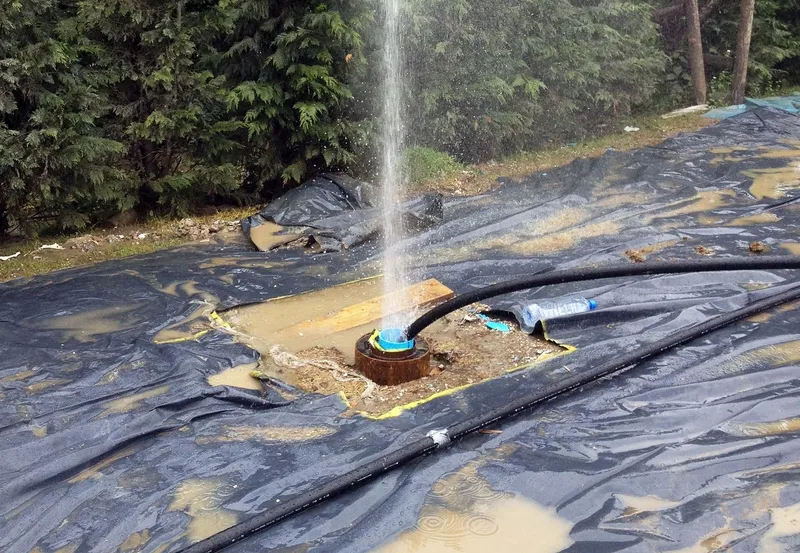
How much does it cost to drill a water borehole in 2023?
Because there are many variables, there’s no fixed cost for drilling a water well. However, as a rule of thumb your private water well, connected to your home and providing running water could cost as little as £23,000.
We’d never advise you accept a cost without the drilling company carrying out a site survey and discussing your needs first. We’ll take into account:
- The geology of your area
- The depth we need to drill
- The width of the borehole
- Pumps and equipment
We’ll always talk through your needs and expectations first by phone. Then we’ll assess your geology to find out if your property is suitable for a water borehole, if everything checks out ok, we’ll arrange a site meeting to discuss your well drilling project in more detail. From there we’ll provide you with a detailed accurate quote and timescale.
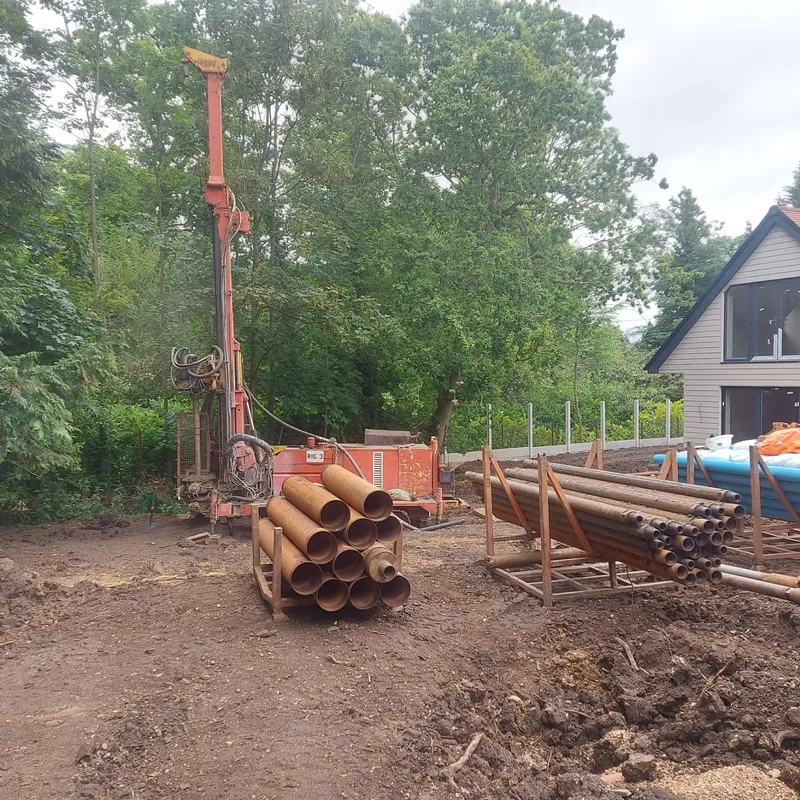
Do I need permission for a water well?
It depends on how much water you think you’ll need! A private land holder can draw 20,000 litres per day from a water well without an abstraction licence, that’s equal to 133 full baths or around 11,429 pints of beer.
The average UK household uses over 349 litres of water per day. So, even if you feel you’re using way too much water – it’s unlikely you’ll use more than that.
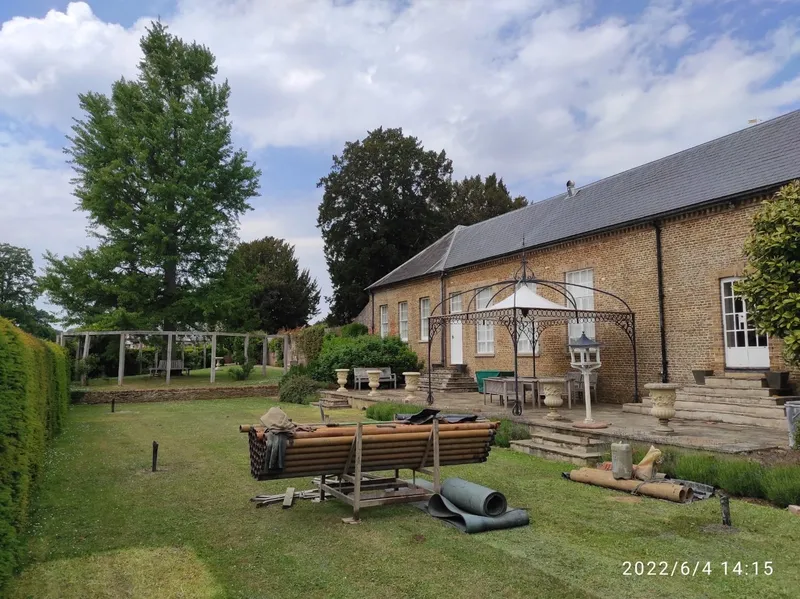
Can I put a well in my garden?
Yes, you certainly can! We’ve drilled 1000s of boreholes for water across the UK – many in gardens and town gardens including central London.
Having a small garden isn’t a barrier to having your own water borehole either. In fact we’ve even drilled tight spaces such as basements, alleyways thanks to our specialist drilling rigs. We’re always respectful that we’re working in a residential space, so one of our priorities is to minimise any disruption to you or your home or garden. The GSI team is very experienced when getting drills on and off your property.
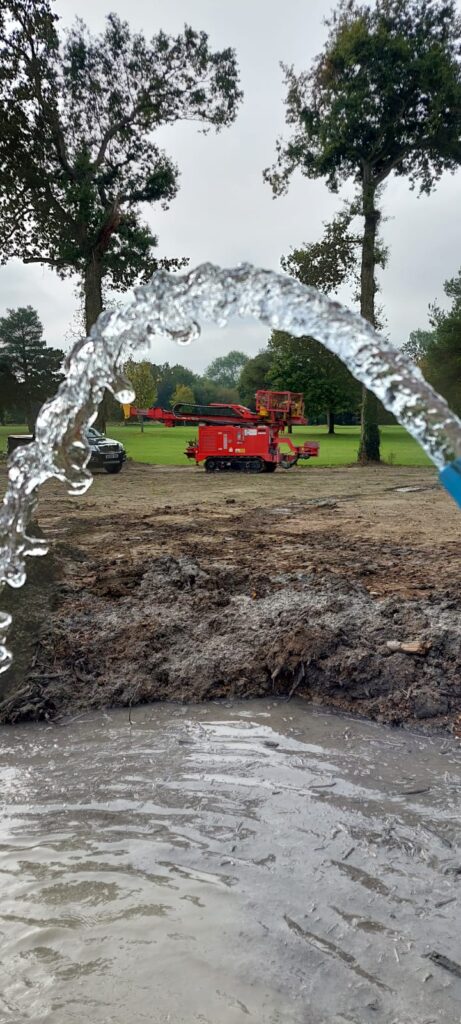
How does a water borehole work?
First we drill down to the aquifer, this can be around 60-80m, but can vary quite a lot depending on your area’s geology.
Once we’ve drilled the borehole it’s cased, sealed and lined.
We fit a well screen and just above a submersible pump. The pump lifts the water up through the rising main then along the discharge pipe to the pressure tank. The well water is stored in the pressure tank, where it goes on to supply your home.
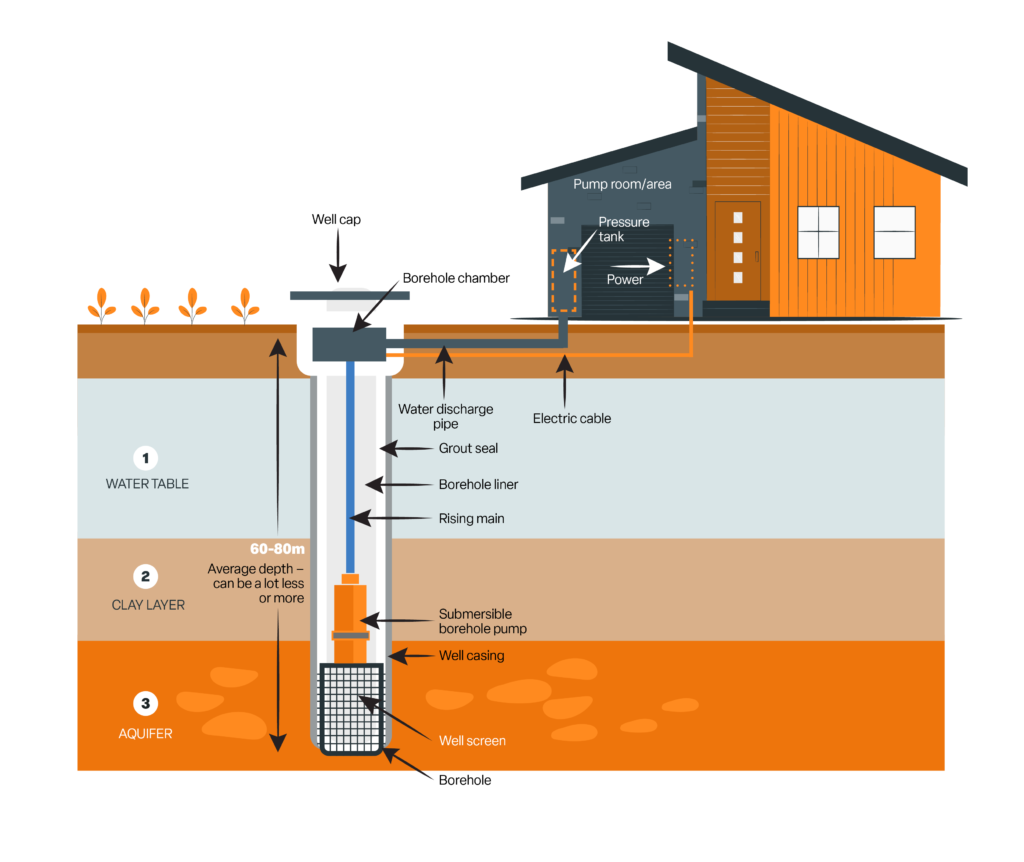
Will I save money with a well?
Even if your property isn’t on a meter, you’ll be paying for each and every drop. And it’s getting more and more expensive: Many water companies and consumer websites are predicting bills will increase in 2023 by another 7.5%.
If you own a business where water is a major element such as agriculture or a fish farm, the water bill is probably your main cost. Even a medium sized office based company can pay over £7,950 per year. Take out standing and sewer charges and your own private water supply means your mains water bills will evaporate. Investing in a borehole for water could save you thousands of pounds every year for many years to come.
Is it safe to drink borehole water?
Yes. Borehole water is an amazing source of drinking water. The water from your borehole will be pure and crystal clear, that’s why more and more people are choosing to have a water system running from a water well. It’s a fact that the water we drink from the tap has been through billions of people!
Many of our customers choose to install a well to water their gardens or fill ponds. If you’re having your borehole installed to only irrigate your garden, water quality isn’t as important. We install all our water boreholes with an extremely durable high-quality PVC casing and grouted seal. However, when we install a well for drinking water we use a special screen, with gravel packed on top. Then we place a mikolite bentonite seal between this and the surface. This stops contamination getting into the aquifer that holds the groundwater, making sure your borehole water supply is pure and 100% safe to drink. We’ll also do flow test to check how much water the borehole produces and its purity.
Will a water well add value to my property?
One of the benefits of water well is that it can increase
the value of your property. Many homebuyers choose properties with their own
water supply, as it provides a sense of self-sufficiency and buyers see its sustainability.
Additionally, having a well can be a selling point for those who are looking for a property with lower utility bills and a reduced environmental impact. So, if you’re considering selling your property in the future, drilling a well could be a wise investment that pays off in the long run.
Will I be self-sufficient with my own water borehole?
We often hear how rising prices and unreliable water companies are making you feel like hostages to your water company.
So just Imagine, your own water well supplying you with pure water. No more supply problems, or burst pipes or hose pipe bans. Additionally, your water pressure will be constant so during times of high water use or drought you won’t be affected.
Can you afford not to invest in a well drilling project?
Is maintaining my well and well water difficult?
No, it’s straightforward. Like most things in your home or business you’ll need to do some basic maintenance to your borehole water supply.
These 5 essential tips will help keep your well in tip-top condition for years to come:
Schedule yearly maintenance checks with a professional.
Keep the area around your well clean and clear from vegetation and chemicals like pesticides.
Test your water quality yearly to ensure there’s no nasties like bacteria, nitrates or other contaminants.
Address anything you find immediately. Whether it’s a problem with the well pump, a system leak, or water contamination, don’t hesitate to call a professional to address the issue.
Remember, regular maintenance will prevent issues with your water well. If you notice any changes in the taste, colour, or smell of your water, or your well pump is making unusual noises, it’s time to call a professional.
Where else are water wells used in the UK?
You’ll find boreholes for water popping up in many commercial settings where water usage is high including:
- Hotels and leisure facilities
- Agriculture and farming
- Care homes
- Golf courses
- Livery yards
- Fish farms
A bit about GSI’s water boreholes
Our boreholes for water are second to none. We offer:
- A no water, no charge guarantee*
- A 3 year works’ guarantee
- You won’t be charged up-front
- A FREE no obligation quote
- We follow the British Drilling Association’s (BDA) recommendations
